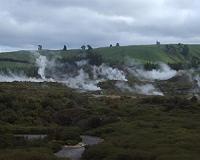| . |  |
. |
Washington (AFP) Dec 16, 2010 US scientists have discovered a woman with a rare brain disease that makes her afraid of nothing -- not a huge snake lurking near her children, not a knife to her throat, and certainly not a horror movie. The woman cannot experience fear because of a condition that has destroyed the part of her brain -- the amygdala -- where researchers say they believe the feeling of fear is made. Over the past two decades researchers have been analyzing the woman, known as SM, for clues about her condition which they say could help them treat post-traumatic stress disorder, particularly in soldiers returning from war. "It is quite remarkable that she is still alive," said lead author Justin Feinstein whose study appears in the journal Current Biology. "The nature of fear is survival and the amygdala helps us stay alive by avoiding situations, people, or objects that put our life in danger," he said. "Because SM is missing her amygdala, she is also missing the ability to detect and avoid danger in the world." Instead of fear, SM, whose rare condition is known as Urbach-Wiethe disease, describes "an overwhelming feeling of curiosity." To test her reaction, researchers led her into an exotic pet store filled with spiders and snakes, animals she repeatedly said she "hates" and tries to avoid. "Upon entering the store, SM was spontaneously drawn to the snake terrariums and appeared visually captivated by the large collection of snakes," the study said. Asked by a store employee if she would like to hold one, SM agreed and then played with one for about three minutes. "She rubbed its leathery scales, touched its flicking tongue, and closely watched its movements as it slithered through her hands," it said. "Her verbal behavior revealed a comparable degree of fascination and inquisitiveness: she repeatedly commented, 'This is so cool!'" When she reached for a tarantula, however, she had to be stopped because there was a high risk she could be bitten. "When asked why she would want to touch something that she knows is dangerous and that she claims to hate, SM replied that she was overcome with 'curiosity,'" the study said. The woman's eldest son, who is in his 20s, told researchers he could not ever recall seeing his mother afraid. He said he remembered one event in particular from his childhood when he was playing with his two brothers and they saw a big snake in the road nearby. "Well, Mom just ran over there and picked it up and brought it out of the street, put it in the grass and let it go on its way," he said. "I thought that was kind of weird." The woman also told researchers that when she was in her 30s, a man grabbed her and stuck a knife to her throat. "She looked at the man and confidently replied, 'If you're going to kill me, you're gonna have to go through my God's angels first.' The man suddenly let her go," said the study, adding the woman then described walking calmly home. Other experiments devised by the researchers -- leading her through a haunted house where people dressed as monsters and ghosts sprung from the darkness, and showing her a series of scary video clips -- fell flat too. "She reacted to the monsters by smiling, laughing, or trying to talk to them," the study said. "She found the fear films to be exciting and entertaining, and in one case, she inquired about the name of the movie so she could rent it from the video store later that day." Scientists believe she was once able to feel fear because she has described a childhood memories of being afraid of the dark, and being once frightened by a dog. They also note that "SM has never been convicted of any crime, but rather has been the victim of numerous crimes," including beatings, muggings at knife and gunpoint, and domestic violence. Feinstein said he hopes that SM's experience could help treat people with post-traumatic stress disorder, a problem he has seen in his work treating US soldiers returning from Iraq and Afghanistan. "Their lives are marred by fear, often times unable to even leave their home due to the ever-present feeling of danger," he said. "By understanding how the brain processes fear, we may one day be able to create treatments that selectively target the brain areas that allow fear to take over our lives." Feinstein said science should look for PTSD treatments that "focus on ways to safely and non-invasively dampen amygdala activity," mainly through medication and psychotherapy.
Share This Article With Planet Earth
Related Links All About Human Beings and How We Got To Be Here
 Early Settlers Rapidly Transformed New Zealand Forests With Fire
Early Settlers Rapidly Transformed New Zealand Forests With FireBozeman MT (SPX) Dec 14, 2010 New research indicates that the speed of early forest clearance following human colonisation of the South Island of New Zealand was much faster and more intense than previously thought. Charcoal recovered from lake-bed sediment cores show that just a few large fires within 200 years of initial colonization destroyed much of the South Island's lowland forest. Grasslands and shrubland replac ... read more |
|
| The content herein, unless otherwise known to be public domain, are Copyright 1995-2010 - SpaceDaily. AFP and UPI Wire Stories are copyright Agence France-Presse and United Press International. ESA Portal Reports are copyright European Space Agency. All NASA sourced material is public domain. Additional copyrights may apply in whole or part to other bona fide parties. Advertising does not imply endorsement,agreement or approval of any opinions, statements or information provided by SpaceDaily on any Web page published or hosted by SpaceDaily. Privacy Statement |